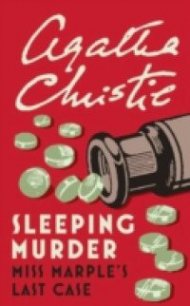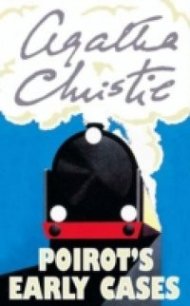Murder on the Orient Express - Christie Agatha (читать книги полные .TXT) 📗
“You may well ask that. First this snow – this stoppage. And now–”
He paused – and a sort of strangled gasp came from the Wagon Lit conductor.
“And now what?”
“And now a passenger lies dead in his berth – stabbed.”
M. Bouc spoke with a kind of calm desperation.
“A passenger? Which passenger?”
“An American. A man called – called–” he consulted some notes in front of him. “Ratchett. That is right – Ratchett?”
“Yes, Monsieur,” the Wagon Lit man gulped.
Poirot looked at him. He was as white as chalk.
“You had better let that man sit down,” he said. “He may faint otherwise.”
The chef de train moved slightly and the Wagon Lit man sank down in the corner and buried his face in his hands.
“Brr!” said Poirot. “This is serious!”
“Certainly it is serious. To begin with, a murder – that in itself is a calamity of the first water. But not only that, the circumstances are unusual. Here we are, brought to a standstill. We may be here for hours – and not only hours – days! Another circumstance – passing through most countries we have the police of that country on the train. But in Jugo-Slavia, no. You comprehend?”
“It is a position of great difficulty,” said Poirot.
“There is worse to come. Dr. Constantine – I forgot, I have not introduced you. Dr. Constantine, M. Poirot.”
The little dark man bowed, and Poirot returned the bow.
“Dr. Constantine is of the opinion that death occurred at about 1 A.M.”
“It is difficult to speak exactly in these matters,” said the doctor, “but I think I can say definitely that death occurred between midnight and two in the morning.”
“When was this M. Ratchett last seen alive?” asked Poirot.
“He is known to have been alive at about twenty minutes to one, when he spoke to the conductor,” said M. Bouc.
“That is quite correct,” said Poirot. “I myself heard what passed. That is the last thing known?”
“Yes.”
Poirot turned toward the doctor, who continued.
“The window of M. Ratchett’s compartment was found wide open, leading one to suppose that the murderer escaped that way. But in my opinion that open window is a blind. Anyone departing that way would have left distinct traces in the snow. There were none.”
“The crime was discovered – when?” asked Poirot.
“Michel!”
The Wagon Lit conductor sat up. His face still looked pale and frightened.
“Tell this gentleman exactly what occurred,” ordered M. Bouc.
The man spoke somewhat jerkily.
“The valet of this M. Ratchett, he tapped several times at the door this morning. There was no answer. Then, half an hour ago, the restaurant car attendant came. He wanted to know if Monsieur was taking dejeuner. It was eleven o’clock, you comprehend.
“I open the door for him with my key. But there is a chain, too, and that is fastened. There is no answer and it is very still in there, and cold – but cold. With the window open and snow drifting in. I thought the gentleman had had a fit, perhaps. I got the chef de train. We broke the chain and went in. He was – Ah! c’etait terrible!”
He buried his face in his hands again.
“The door was locked and chained on the inside,” said Poirot thoughtfully. “It was not suicide – eh?”
The Greek doctor gave a sardonic laugh. “Does a man who commits suicide stab himself in ten-twelve-fifteen places?” he asked.
Poirot’s eyes opened. “That is great ferocity,” he said.
“It is a woman,” said the chef de train, speaking for the first time. “Depend upon it, it was a woman. Only a woman would stab like that.”
Dr. Constantine screwed up his face thoughtfully.
“She must have been a very strong woman,” he said. “It is not my desire to speak technically – that is only confusing; but I can assure you that one or two of the blows were delivered with such force as to drive them through hard belts of bone and muscle.”
“It was clearly not a scientific crime,” said Poirot.
“It was most unscientific,” returned Dr. Constantine. “The blows seem to have been delivered haphazard and at random. Some have glanced off, doing hardly any damage. It is as though somebody had shut his eyes and then in a frenzy struck blindly again and again.”
“C’est une femme,” said the chef de train again. “Women are like that. When they are enraged they have great strength.” He nodded so sagely that everyone suspected a personal experience of his own.
“I have, perhaps, something to contribute to your store of knowledge,” said Poirot. “M. Ratchett spoke to me yesterday. He told me, as far as I was able to understand him, that he was in danger of his life.”
“ ‘Bumped off’ – that is the American expression, is it not?” asked M. Bouc. “Then it is not a woman. It is a ‘gangster’ or a ‘gunman.’ ”
The chef de train looked pained at seeing his theory come to nought.
“If so,” said Poirot, “it seems to have been done very amateurishly.” His tone expressed professional disapproval.
“There is a large American on the train,.” said M. Bouc, pursuing his idea. “A common-looking man with terrible clothes. He chews the gum, which I believe is not done in good circles. You know whom I mean?”
The Wagon Lit conductor to whom he had appealed nodded.
“Oui, Monsieur, the No. 16. But it cannot have been he. I should have seen him enter or leave the compartment.”
“You might not. You might not. But we will go into that presently. The question is, what to do?” He looked at Poirot.
Poirot looked back at him.
“Come, my friend,” said M. Bouc. “You comprehend what I am about to ask of you. I know your powers. Take command of this investigation! No, no, do not refuse. See, to us it is serious – I speak for the Compagnie Internationale des Wagons Lits. By the time the Jugo-Slavian police arrive, how simple if we can present them with the solution! Otherwise delays, annoyances, a million and one inconveniences. Perhaps, who knows, serious annoyance to innocent persons. Instead – you solve the mystery! We say, ‘A murder has occurred – this is the criminal!’”
“And suppose I do not solve it?”
“Ah, mon cher!” M. Bouc’s voice became positively caressing. “I know your reputation. I know something of your methods. This is the ideal case for you. To look up the antecedents of all these people, to discover their bona fides – all that takes time and endless inconvenience. But have I not heard you say often that to solve a case a man has only to lie back in his chair and think? Do that. Interview the passengers on the train, view the body, examine what clues there are, and then – well, I have faith in you! I am assured that it is no idle boast of yours. Lie back and think – use (as I have heard you say so often) the little grey cells of the mind – and you will know!”
He leaned forward, looking affectionately at the detective.
“Your faith touches me, my friend,” said Poirot emotionally. “As you say, this cannot be a difficult case. I myself last night – but we will not speak of that now. In truth, this problem intrigues me. I was reflecting, not half an hour ago, that many hours of boredom lay ahead whilst we are stuck here. And now – a problem lies ready to my hand.”
“You accept then?” said M. Bouc eagerly.
“C’est entendu. You place the matter in my hands.”
“Good – we are all at your service.”
“To begin with, I should like a plan of the Istanbul-Calais coach, with a note of the people who occupied the several compartments, and I should also like to see their passports and their tickets.”
“Michel will get you those.”
The Wagon Lit conductor left the compartment.
“What other passengers are there on the train?” asked Poirot.
“In this coach Dr. Constantine and I are the only travellers. In the coach from Bucharest is an old gentleman with a lame leg. He is well known to the conductor. Beyond that are the ordinary carriages, but these do not concern us, since they were locked after dinner had been served last night. Forward of the Istanbul-Calais coach there is only the dining-car.”



